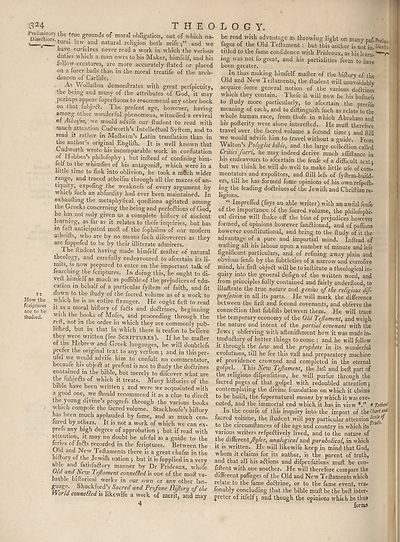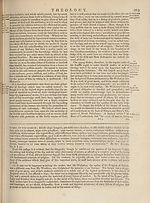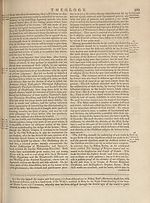Encyclopaedia Britannica, or, a Dictionary of arts, sciences, and miscellaneous literature : enlarged and improved. Illustrated with nearly six hundred engravings > Volume 20, SUI-ZYM
(366) Page 324
Download files
Complete book:
Individual page:
Thumbnail gallery: Grid view | List view

324
l^e !me 8rounds ITlcr^ obligation, out of which na-
t ^ . tural law and natural religion both arife j’’ and we
have ourfelves never read a work in which the various
duties which a man owes to his Maker, himfelf, and his
fellow-creatures, are more accurately ftated or placed
on a furer bafis than in the moral treatife of the arch¬
deacon of Carlille.
As Wollafton demonftrates with great perfpicuity,
the being and many of the attributes of God, it may
perhaps appear fuperfluous to recommend any other book
on that fubjecl. Ihe prefent age, however, having
among ctner wonderful phenomena, witneiTed a revival
of Atheifra, we would advife our Hudent to read with
much attention Cudworth’s Intellectual Syftem, and to
read it rather in Molheim’s Latin tranllation than in
the author’s original^ Ehglifh. It is well known that
Cud worth wwote his incomparable work in confutation
Hobbes s philofophy j but inftead of confining him-
felf to the whimfies of his antagonift, which were in a
little time to fink into oblivion, he took a milch wider
range, and traced atheifm through all the mazes of an¬
tiquity, expofing the weaknefs of every argument by
which fuch an abfurdity had ever been maintained. In
exhaufting the metaphyfical queftions agitated among
the Greeks concerning the being and perfections of God,
he has not only given us a complete hiftory of ancient
learning, as far as it relates to thefe inquiries, but has
in fa ft anticipated moft of the fophifms of our modern
atheills, who are by no means fuch dilcoverers as they
are fuppofed to be by their illiterate admirers.
The ftudent having made himfelf mailer of natural
theology, and carefully endeavoured to afeertain its li¬
mits, is now prepared to enter on the important talk of
feaichjng the feriptures. In doing this, he ought to di-
\eil himfelf as much as pollibleof the prejudices of edu¬
cation in behalf of a particular fyltem of faith, and fit
T2 down to the Uudy of the facred volume as of a work to
riow the which he is an entire ftranger. He ought firil to read
are^to'be ^a mora^ hiftory of fafls and doCtrines, beginning
itudied. with the books of Mofes, and proceeding through the
relt, not in the order in which they are commonly pub-
liihed, but in that in which there is reafon to believe
they were written (fee Scriptures'). If he be mailer
of the Hebrew, and Greek languages, he will doubtlefs
prefer the original text to any verfion *, and in thisper-
ufal we would advife him to confult no commentator,
becaufe his objefl at prefent is not to lludy the dodlrines
contained in the bible, but merely to difeover what are
the fubjeas of which it treats. Many hillories of the
bible have been written ; and were we acquainted with
a good one, we fhould recommend it as a clue to direa
the. young divine’s progrefs through the various books
which compofe the facred volume. Stackhoufe’s hillory
haa been much applauded by fome, and as much cen-
fured by others. It is not a work of which we can ex-
prefs any high degree of approbation ; but if read with
attention, it may no doubt be ufeful as a guide to the
feries of faas recorded in the feriptures. Between the
Old and New 1 eftaments there is a great chafm in the
hiftory of the Jewilli nation j but it is fupplied in a very
able and fatisfa&ory manner by Dr Prideaux, whole
O/t/ and New Tejiatnent eonneEled is one of the molt va¬
luable hiftorical works in our own or any other lart-
guage. Shuckford’s Sacred and Profane Hijlory of the
War„d canne&ed is likewife a work of merit, and may
4
THEOLOGY.
be read vvith advantage as throwing light on many paC-WiJ
lages of the Old Teltament: but this author is not in-Direftk
titled to the fame confidence with Prideaux, as his learn-
ing was not fo great, and his partialities feem to have
been greater.
In thus making himfelf mailer of the hillory of the
Old and New Teltaments, the Undent will unavoidably
acquire fome general notion of the various dodlrines
which they contain. Thefe it will now be his bufinefs
to lludy more particularly, to afeertain the precife
meaning of each, and to dillinguilh fuch as relate to the
whole human race, from thofe in which Abraham and
his pollerity were alone interelled. He mull therefore
travel over the facred volume a fecond time ; and Hill
we would advife him to travel without a guide. From
Walton’s Polyglot bible, and the large colle&ion called
Critici f ieri, he may indeed derive much affillance in
his endeavours to afeertain the fenfe of a difficult text •
but we think he will do well to make little ufe of com!
mentators and expofitors, and dill lels of fyllem-build-
ers, till he has formed fome opinions of his own refpeft-
ing the leading do&rinesof the Jewiffi and Chriftianre.
ligions.
“ Imprefled (fays an able writer) with an awful fenfe
of the importance of the facred volume, the philofophi-
cal divine will (hake off the bias of prejudices however
formed, of opinions however fandlioned, and of paffions
however conflitutional, and bring to the lludy of it the
advantage of a pure and impartial mind. Inllead of
wafting all his labour upon a number of minute and lefs
fign.ificant particulars, and of refining away plain and
obvious .fenfe by the fubtleties of a narrow and corrofive
mind, his firft objecl will be to inftitute a theological in¬
quiry into the general defign of the written word, and
from principles fully contained and fairly underftood, to
illuftra te the true nature and genius of the religious dif
penfation in all its parts. He will mark the difference
between the firft and fecond covenants, and obferve the
conneflion that fubfifts between them. He will trace
the temporary economy of the Old T. ef ament, and weigh
the nature and intent of the partial covenant with the
Jews 5 obferving with aftonifhment how it was madein-
trodudlory of better things to come : and he will follow
it through the law and the prophets in its wonderful
evolutions, till he fee this vaft and preparatory machine
©f providence crowned and completed in the eternal
gofpel. I his New Tef ament, the laft and bell part of
the religious difpenfation, he will purfue through the
facred pages of that gofpel with redoubled attention}
contemplating the divine foundation on which it claims
to be built, the fupernatural means by which it was exe¬
cuted, and the immortal end which it has in view * Tathad
In the courfe of this inquiry into the import of ihe Mart and
facred volume, the ftudent will pay particular attention
to the circumftances of the age and country in which its lU *
various writers refpedlively lived, and to the nature of
the different f yles, analogical and parabolical, in which
it is written. He will likewife keep in mind that God,
whom it claims for its author, is the parent of truth,
and that all his actions and difpenfations muft be con-
fiftent with one another. He will therefore compare the
different paffages of the Old and New Teftaments which
relate to the fame dodlrine, or to the fame event, rea*
fonably concluding that the bible muft be the bell inter¬
preter of itfelf j and though the opinions which he thus
forms
l^e !me 8rounds ITlcr^ obligation, out of which na-
t ^ . tural law and natural religion both arife j’’ and we
have ourfelves never read a work in which the various
duties which a man owes to his Maker, himfelf, and his
fellow-creatures, are more accurately ftated or placed
on a furer bafis than in the moral treatife of the arch¬
deacon of Carlille.
As Wollafton demonftrates with great perfpicuity,
the being and many of the attributes of God, it may
perhaps appear fuperfluous to recommend any other book
on that fubjecl. Ihe prefent age, however, having
among ctner wonderful phenomena, witneiTed a revival
of Atheifra, we would advife our Hudent to read with
much attention Cudworth’s Intellectual Syftem, and to
read it rather in Molheim’s Latin tranllation than in
the author’s original^ Ehglifh. It is well known that
Cud worth wwote his incomparable work in confutation
Hobbes s philofophy j but inftead of confining him-
felf to the whimfies of his antagonift, which were in a
little time to fink into oblivion, he took a milch wider
range, and traced atheifm through all the mazes of an¬
tiquity, expofing the weaknefs of every argument by
which fuch an abfurdity had ever been maintained. In
exhaufting the metaphyfical queftions agitated among
the Greeks concerning the being and perfections of God,
he has not only given us a complete hiftory of ancient
learning, as far as it relates to thefe inquiries, but has
in fa ft anticipated moft of the fophifms of our modern
atheills, who are by no means fuch dilcoverers as they
are fuppofed to be by their illiterate admirers.
The ftudent having made himfelf mailer of natural
theology, and carefully endeavoured to afeertain its li¬
mits, is now prepared to enter on the important talk of
feaichjng the feriptures. In doing this, he ought to di-
\eil himfelf as much as pollibleof the prejudices of edu¬
cation in behalf of a particular fyltem of faith, and fit
T2 down to the Uudy of the facred volume as of a work to
riow the which he is an entire ftranger. He ought firil to read
are^to'be ^a mora^ hiftory of fafls and doCtrines, beginning
itudied. with the books of Mofes, and proceeding through the
relt, not in the order in which they are commonly pub-
liihed, but in that in which there is reafon to believe
they were written (fee Scriptures'). If he be mailer
of the Hebrew, and Greek languages, he will doubtlefs
prefer the original text to any verfion *, and in thisper-
ufal we would advife him to confult no commentator,
becaufe his objefl at prefent is not to lludy the dodlrines
contained in the bible, but merely to difeover what are
the fubjeas of which it treats. Many hillories of the
bible have been written ; and were we acquainted with
a good one, we fhould recommend it as a clue to direa
the. young divine’s progrefs through the various books
which compofe the facred volume. Stackhoufe’s hillory
haa been much applauded by fome, and as much cen-
fured by others. It is not a work of which we can ex-
prefs any high degree of approbation ; but if read with
attention, it may no doubt be ufeful as a guide to the
feries of faas recorded in the feriptures. Between the
Old and New 1 eftaments there is a great chafm in the
hiftory of the Jewilli nation j but it is fupplied in a very
able and fatisfa&ory manner by Dr Prideaux, whole
O/t/ and New Tejiatnent eonneEled is one of the molt va¬
luable hiftorical works in our own or any other lart-
guage. Shuckford’s Sacred and Profane Hijlory of the
War„d canne&ed is likewife a work of merit, and may
4
THEOLOGY.
be read vvith advantage as throwing light on many paC-WiJ
lages of the Old Teltament: but this author is not in-Direftk
titled to the fame confidence with Prideaux, as his learn-
ing was not fo great, and his partialities feem to have
been greater.
In thus making himfelf mailer of the hillory of the
Old and New Teltaments, the Undent will unavoidably
acquire fome general notion of the various dodlrines
which they contain. Thefe it will now be his bufinefs
to lludy more particularly, to afeertain the precife
meaning of each, and to dillinguilh fuch as relate to the
whole human race, from thofe in which Abraham and
his pollerity were alone interelled. He mull therefore
travel over the facred volume a fecond time ; and Hill
we would advife him to travel without a guide. From
Walton’s Polyglot bible, and the large colle&ion called
Critici f ieri, he may indeed derive much affillance in
his endeavours to afeertain the fenfe of a difficult text •
but we think he will do well to make little ufe of com!
mentators and expofitors, and dill lels of fyllem-build-
ers, till he has formed fome opinions of his own refpeft-
ing the leading do&rinesof the Jewiffi and Chriftianre.
ligions.
“ Imprefled (fays an able writer) with an awful fenfe
of the importance of the facred volume, the philofophi-
cal divine will (hake off the bias of prejudices however
formed, of opinions however fandlioned, and of paffions
however conflitutional, and bring to the lludy of it the
advantage of a pure and impartial mind. Inllead of
wafting all his labour upon a number of minute and lefs
fign.ificant particulars, and of refining away plain and
obvious .fenfe by the fubtleties of a narrow and corrofive
mind, his firft objecl will be to inftitute a theological in¬
quiry into the general defign of the written word, and
from principles fully contained and fairly underftood, to
illuftra te the true nature and genius of the religious dif
penfation in all its parts. He will mark the difference
between the firft and fecond covenants, and obferve the
conneflion that fubfifts between them. He will trace
the temporary economy of the Old T. ef ament, and weigh
the nature and intent of the partial covenant with the
Jews 5 obferving with aftonifhment how it was madein-
trodudlory of better things to come : and he will follow
it through the law and the prophets in its wonderful
evolutions, till he fee this vaft and preparatory machine
©f providence crowned and completed in the eternal
gofpel. I his New Tef ament, the laft and bell part of
the religious difpenfation, he will purfue through the
facred pages of that gofpel with redoubled attention}
contemplating the divine foundation on which it claims
to be built, the fupernatural means by which it was exe¬
cuted, and the immortal end which it has in view * Tathad
In the courfe of this inquiry into the import of ihe Mart and
facred volume, the ftudent will pay particular attention
to the circumftances of the age and country in which its lU *
various writers refpedlively lived, and to the nature of
the different f yles, analogical and parabolical, in which
it is written. He will likewife keep in mind that God,
whom it claims for its author, is the parent of truth,
and that all his actions and difpenfations muft be con-
fiftent with one another. He will therefore compare the
different paffages of the Old and New Teftaments which
relate to the fame dodlrine, or to the fame event, rea*
fonably concluding that the bible muft be the bell inter¬
preter of itfelf j and though the opinions which he thus
forms
Set display mode to:
![]() Universal Viewer |
Universal Viewer | ![]() Mirador |
Large image | Transcription
Mirador |
Large image | Transcription
Images and transcriptions on this page, including medium image downloads, may be used under the Creative Commons Attribution 4.0 International Licence unless otherwise stated. ![]()
| Permanent URL | https://digital.nls.uk/192279305 |
|---|
| Description | Plates 516, 519 and 520 missing. |
|---|---|
| Attribution and copyright: |
|
| Description | Ten editions of 'Encyclopaedia Britannica', issued from 1768-1903, in 231 volumes. Originally issued in 100 weekly parts (3 volumes) between 1768 and 1771 by publishers: Colin Macfarquhar and Andrew Bell (Edinburgh); editor: William Smellie: engraver: Andrew Bell. Expanded editions in the 19th century featured more volumes and contributions from leading experts in their fields. Managed and published in Edinburgh up to the 9th edition (25 volumes, from 1875-1889); the 10th edition (1902-1903) re-issued the 9th edition, with 11 supplementary volumes. |
|---|---|
| Additional NLS resources: |
|

